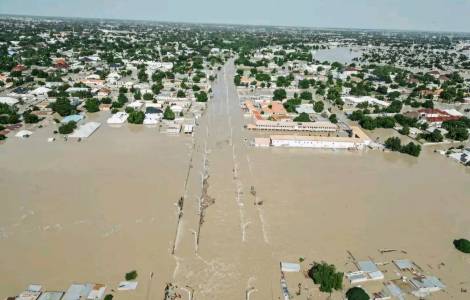
Abuja (Agenzia Fides) - "We are affected by the worst floods in 30 years," reports the diocese of Maiduguri, the capital of Borno state in northeastern Nigeria, which was flooded on September 10 following the collapse of the Alau dam, on its Facebook page. The reservoir, located about 20 km south of the city, gave way due to the rains that have been hitting the area since the end of August. "There is neither food nor enough shelter or sanitation for the displaced. The government has reopened the shelters for the displaced, but they are overwhelmed by the number of people seeking shelter," reports the diocese. "Detailed reports say that the Islamic cemetery is flooded. Someone reported seeing victims floating on the water that has flooded the streets. The wildlife park (zoo) has also been affected and some animals, some of them dangerous, are roaming the city. There are also reports of a prison break.” In addition, the sewage system has burst, increasing the risk of epidemic outbreaks, especially since the water has also entered hospitals such as the University Hospital. The buildings affected include the Maiduguri Cathedral, which has been flooded. The flooding has also affected major markets, including grain, fruit and vegetable shops, while many shopping centers remain closed, leading to severe food shortages, with the few available food items being sold at very high prices. This worsens the situation of the poorer sections of the population, who are already struggling with the sharp rise in food prices due to high inflation. According to the World Food Programme, more than 4 million people in Borno State were already in severe food distress before the flooding. The jihadist movement Boko Haram emerged in and around Maiduguri in 2009, and its actions have forced hundreds of thousands of villagers in the area to flee over the years. Among those most affected by the floods are those who still live in the camps for displaced persons set up in Maiduguri and who have not been able to return to their homes. The diocesan communication refers to these facilities. These camps are now also housing the citizens of Maiduguri who lost their homes in the floods. According to an initial official assessment, the number of flood victims is around 30 and the number of displaced persons around 400,000, but the number of people more or less severely affected by the disaster is around one million. The diocese's message concludes with a call for prayers and donations for the victims: "Please pray for us. The diocese of Maiduguri will ask for support in helping those affected." The Alau Dam was built in 1986 to provide water to farmers in Maiduguri and to contain the floods of the Ngadda River when it carries more water than normal. (L.M.) (Agenzia Fides, 13/9/2024)